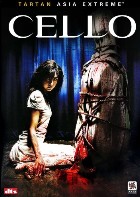
Peeling back the polite socially conservative skin of cultural taboo with fingers dipped as much in subversively thoughtful questions of self and society as they are in pools of blood, Asian cinema is infamous (and revered) for dissecting psychical, emotional, and intellectual borderlands of possibility and nightmare that other aesthetic forms have little interest in. Cello lovingly manipulates the anxieties lurking beneath the polite veneer of the everyday, on one hand celebrating the heartache and emotionally shattering process of deterioration, on the other hand capturing with brutal honesty our commonly shared faith in point-of-view and the stability of relationships. The directorial debut of Lee Woo-chul, this chilling and bloody effort is as deceptive in its revolving tone of approach as it is subversive in its poisonous themes. Ranging from heart-breaking intensity to deceitfully 'quiet' whispers, Cello digs deep into our sub-conscious precisely because its quieter moments of pathos are so very much more effective than the unrelenting screams of gaudier films.
Crossing taboos of relationships, exploring themes that other cultures fear to approach, Cello is a dissection of emotional stability, familial breakdown, and the unceasing conflict between culture and gender, phenomena and self. Both entertaining and mean-spirited, vicious in its embrace of uncompromising tragedy, the story follows its dark thematic threads to a horrible, unbelievably grim conclusion. Focusing on the alienated, the lost, the ill, and the seemingly average people who live in unsatisfying private hells, caught like flies to paper in a sleep-walk between work, home, bed, and meals, this character study focusing on its estranged and threatened heroine, rooting its possibly supernatural wonders in the psychological frailties of its characters. Of more obvious interest for the ghost story fan is the film's glimpses of a lurking Otherworld that makes itself known through extensions of every day stress. Simply put, Cello digs straight to the foul, degraded, self-illusory pit of our pitiful human condition while never forgetting its obligation to entertain.
Mi-ju (Sung Hyun-Ah), a talented cellist whose mounting social and personal pressures have caused her to seek out peace and domestic stability -- an emotional and physical place wherein she can reflect on herself and engage in self-introspection -- is plagued by guilt and superstitious panic after surviving a car crash that killed a friend. Tormented by nightmarish memories of the accident, unsure why she was spared, and tormented by guilt, she bows out of a once-promising career as a musician, instead opting to withdraw into a more quiet life of teaching. Sharing her love of music to college students, one of whom attacks her, and to her daughter, whom she soon is estranged from, her situation goes from bad to worse in a flurry of physical and emotional attacks. A rash of inexplicable, increasingly threatening events follow the attack of an angry student. Meanwhile she wonders if her sister-in-law may harbor desire for her fiancée, and the new housekeeper inspires her distrust. Cello is as notable for what it doesn't show as for what it does, suggesting through a menacing web of increasingly claustrophobic conflicts -- many of which are linked directly to character's fears -- an intelligence and sensitivity rare to genre storytelling. Only when strikingly ominous music begins to waft like ghosts of guilt from her daughter's cello, do we begin to suspect the spectral dread of what's to come . . .
Reflecting the universal terrors within the intimate anxiety of the individual, the ghost story has long scared and challenged audiences with its exploration of not only death and the afterlife but the complexities of the human heart. Cello continues this tradition, layering into its supernatural context questions of guilt, personal responsibility, and emotional breakdown. A fear fable with a counte cruelle twist, this destructive echo of memory is a scathing comment on parenting, love, and stress. Re-imagining traditional sources of cultural fear -- the unknown, death, the spectral -- by investing/interweaving them with intense moral dilemma, Lee Woo-chul is as focused on the personal culpability of Mi-ju, and in finding meaning in a world haunted by emotion, as he is in weaving an old-fashioned folktale. Devoting equal time to quiet pathos as shriek-show-style titillation, this burnt offering from Tartan Asia Extreme achieves impressive heights of unease through carefully constructed moments of suspense which are themselves mirrored by tragic internal revelations.
A sensitive re-imagining of supernatural suggestion and unbearable mental illness, Cello pulsates with implied fear and awe. Exploring both universal fears and intimate anxieties, reflecting in the lens of the unknown the instantly recognizable turmoil of a world easily assaulted by fate and personal decision, this film devotes an admirable amount of effort on characterization. Likewise its introspective approach towards plot is lent additional substance changing the rules on us just when we think we've discovered the direction events are taking. In the end, Cello confronts us with a demented spirit world existing partially in -- and somewhat shaped by -- our own sense of self-judgment. A ghost story of the mind!
Review by William P Simmons
| Released by Tartan Asia Extreme USA |
| Region 1 NTSC |
| Not Rated |
| Extras : see main review |